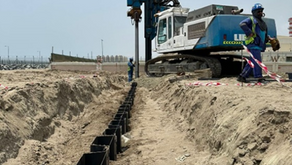Which Is Better, Steel or Aluminum Trench Shield?
- ESC Group

- Oct 1, 2022
- 4 min read
Trench shields or trench boxes are usually made of steel or aluminum because both are strong and durable metals besides being abundant, recyclable, and cost-effective. In excavation and trenching works, steel and aluminum trench shield equally shares critical contribution in improving safety, quality, and productivity at construction sites. However, there are comparisons between the two with reference to their economical and overall performance.

The best way to understand or compare the two is possibly by establishing their features as raw materials and citing their pros and cons as finish products. It is important to dig into their features against the essentials of trench protection system like weight, cost, strength, and lifespan.
Strength to Weight Ratio
Aluminum has a tensile strength of 100 MPa and a density of 2.70g/cm3. Structural steel has a tensile strength of 350 MPa and a density of 8.0g/cm3.
Therefore, aluminum is lighter than steel. Steel is stronger than aluminum.
Cost
At same weight, aluminum is more expensive than stainless steel. However, aluminum is about 3X lighter than structural steel.
Therefore, at same volume, steel is generally cheaper but can be more expensive than aluminum at some point.
Hardness/Malleability
Grade 5052 aluminum is very soft or malleable. Grade 6061 is likely to crack if bent. Steel is less likely to warp or bend from force, impact, or heat.
Therefore, aluminum is weaker than steel and more prone to dents and scratches.
Corrosion Resistance
Aluminum has excellent corrosion resistance and does not rust. Aluminum alloys comes in different classifications such as 6061 and 5052 which is considered a marine grade. Structural steel with iron as main composition triggers oxidation when exposed to oxygen, thus, prone to rust.
Therefore, steel must be equipped with a superior coating system to inhibit good corrosion resistance next to aluminum.



Weight
Steel trench shield is typically 2X heavier than aluminum shield. Density of a material corresponds to its strength, making steel as the stronger between the two. However;
Due to its weight, steel shields requires larger plant or equipment to mobilize and install them. Lightweight aluminum shields at the other hand can be lifted by small machineries or by manpower.
Application
Steel shields as denser equipment has higher pressure ratings. Steel shields has standard or custom sizes up to 10ft high x 32ft long. Aluminum shields are available in sizes up to 8ft high x 16ft long. Steel cages or boxes are best suitable for deep and extensive excavation works.
Aluminum shields are ideal for smaller jobs such as emergency repairs and routine maintenance. They are also applicable for jobsites and situations where heavy equipment is not available or restricted.
Cost-effectivity
At a given size, steel shields are generally cheaper than aluminum shields although overall cost, say total project cost, may be different due to many contributing factors. Besides the cost of trench box unit, other expenditures like mobilization, installation, and labor cost adds up to the summary of actual price.
Steel shields requires larger machineries, more manpower, and bigger area to carry out assembly and installation. The bigger extent of operation also requires higher level of safety precautions. Aluminum trench boxes at the other hand, are easier to install but are limited to lower range of pressure ratings and area coverage. Aluminum shields when built to serve higher depth ratings may incur uneconomical prices or weight-strength imbalance.
Lifespan
Steel shields are tough and designed to endure extreme site conditions but they are prone to corrosion which greatly affects their performance and lifespan. Aluminum does not corrode but are weak against impact and abrasions.
Longevity of steel shields therefore varies from every circumstance. It is a matter of having different strengths and weaknesses. Their lifecycle depends on many conditions such as intensity of usage, manner of handling, maintenance & preservation routine, and more. It also depends upon engineering methods and techniques used to protect the metals from the adverse effects of the environment. Steel requires effective protective coating to counter corrosion while aluminum can be equipped with steel frames to withstand impacts and scratches.




The answer is NONE. Each material has distinct strengths suitable for every particular application.
Trenches and excavations comes in different magnitudes and configurations, they can be wide, deep, narrow, or shallow. Whichever is the case, it is important to employ the optimum, most practical trench protection solution available. While steel trench boxes are suitable for bigger jobs, the amount of work and money that goes into the installation process makes them impractical for smaller scopes. And while aluminum shields are ideal for smaller errands, the cost of upgrading them to achieve the robustness required for large applications is unjustifiable.
ESC OFFERS BOTH STEEL AND ALUMINUM TRENCH SHIELDS
Because of having a deep understanding and experience in the business, ESC offers both steel and aluminum trench shields in standard and custom sizes. Our equipment is cost effective, safe and versatile, relied upon by underground utility professionals, municipalities and private contractors, locally and international. All of our products are certified by Engineering Professionals and are compliant to OSHA’s excavation and trench safety standards.
Call us today at +971 2550 6188 or visit us at www.escpiling.com












